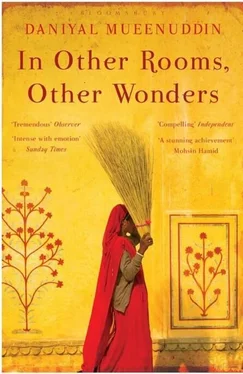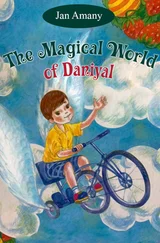‘Goodbye,’ he said, looking at her. As he reached the door, leaving her sitting on the floor, he realized that he couldn’t do this, that he must say more, although he had told himself that he wouldn’t. He remembered the morning when he married her, quietly signing the papers while sitting under the mulberry tree in the little courtyard of this house, with the sounds of the village in the background, goats and a radio playing a song and tractors driving down the street.
‘I’ve told the boys to give you something after I’m gone,’ he said, without looking at her.
‘Fine,’ she replied, in a clipped voice.
Both of them knew that this meant nothing.
He walked out under the big banyan, where Mustafa toiled over the jeep, polishing it. The managers stood to one side, not speaking to each other. Jaglani got into the jeep and offhandedly said goodbye forever.
In the next few days Jaglani intended to do something for Zainab, to put a house in her name, for he had several in the city, or to give her a square of land. His children would anyway have so much, and after his death Zainab would be attacked from all sides, by the villagers and by his family. But his illness progressed very quickly, and the constant pain kept him from acting. He chose the path of least resistance, and his family ensured that this path always led to them and to the gratification of their interests. The papers ensuring their inheritance readily appeared whenever he had the impulse to sign them, whereas other documents, those that did not suit the two sons, were delayed indefinitely. The sons had agreed not to fight among themselves, but to divide the property equally. They also agreed to prevent their father from making any other disposition.
The servants moved Jaglani’s bed into the living room of his house. They removed the furniture, except for one sofa, placing the bed in the middle, with a table covered with medicines next to it. On the floor stood a tin bucket, and then, contrastingly, two thin oxygen cylinders almost as tall as a man, with dented steel bodies, nickel fittings, and a profusion of clear tubes feeding him air through a cannula pinched onto his nose, the apparatus setting him apart from those who now surrounded him. Day and night, one or another of the servants would press his arms and legs. Jaglani grew angry with the servants, making cruel and untrue accusations, that they were hurting him, that they had always stolen from him. One of Jaglani’s patrons, Makhdoom Talwan, paid a visit, a great landowner of the district, toward whom he had always been deferential. Now, when this man entered the room, Jaglani started up and told him to go to hell, began shrieking about stolen votes and stolen water, until he couldn’t speak and lay panting. The family bustled the great man away.
Every day, at some moment when the room stood empty except for the servant on duty, Mustafa would come to pay his respects, one of the few people whom Jaglani looked on with kind eyes. Mustafa would remove his shoes and stand just inside the door with bare feet. Jaglani would call him forward, to stand beside the bed, and would say a few inconsequential words, asking about Dunyapur. Mustafa answered the questions very briefly and would stand beside him until he fell asleep.
Jaglani became weaker and angrier, until everyone wished he would die. One day he heard a commotion in the anteroom, raised voices and doors slamming. Zainab had come, taking a tonga from Dunyapur and then a bus, walking solitary up to the house, past the gatekeeper, who had become slack and who watched her without bothering even to get up from the chair where he sat smoking a hookah. He knew her, for like all the servants Jaglani had chosen him from the village.
The sick man heard her in the anteroom say to Shabir, the son, who had rushed to intercept her, ‘Get your hands off me, you little piece of shit. I’m his wife. Don’t touch me.’ Jaglani reached painfully and rang the bell on a cord that lay by his pillow. Shabir came in, locking the door behind him.
‘Tell her to go away,’ said the dying man. ‘I don’t want to see her.’ She had spoken in the most vulgar Punjabi, like women screaming over the common wall of their village huts.
Lying alone, unable to sleep, Jaglani had for days been renouncing Zainab. He had done wrong to his sons and to his senior wife, whom he didn’t love, had never loved. His first wife and his sons belonged to another time, to his days of strength, when the world stood open to him. He remembered the river, the way it glittered in his youth and in his manhood. He married his first wife at seventeen, when he still earned a salary of only forty rupees, and she rose with him, made his meals, and now old, an image of his mother, wore smudged glasses and with teary eyes stood over him when he ate. She would die soon, would never again be happy. She hadn’t been happy for years. Zainab would go on, she had life in her, vitality, many years ahead. He didn’t want her to live on after him.
Mustafa took Zainab outside and walked her back through the gates of the compound and out into the busy street, where no one cared that Jaglani lay dying in the big house, or if they knew of it, thought only of the changes to come, new men up, old men down, Jaglani’s adherents thrown down. Zainab wept quietly and kept saying to herself, ‘And they didn’t even offer me a cup of tea.’
Two nights later Jaglani died. The cancer had spread to his lymph nodes and to his brain, and he died in great pain, despite the morphine. A man from the city came and laid him out, bathing his body, tying his mouth shut with a strip of gauze. At the burial, held by custom before nightfall, the two sons stood next to Jaglani’s patron, Makhdoom Talwan, the dominant landlord and politician in the district, a member of the National Assembly. Makhdoom Sahib said to Shabir, ‘So now it’s your seat to lose in the by-election.’ Immediately after the burial his driver brought his big Land Cruiser jeep right up to the gates of the old cemetery, blocking the flow of mourners. Shaking hands with the two sons, looking with penetration at each of them, he drove away into the falling night, having said nothing more of the elections, offering no support.
Nevertheless, Shabir went to see the great man. Preparations for the by-election had begun in earnest, groups of men were gathering and going around together, forming alliances, bartering votes, but few people came to see Shabir, and the ones who did were lightweights. The gatekeeper at Makhdoom Talwan’s house leapt up on seeing Jaglani’s car, but Shabir found that the further he penetrated into the sanctum, the colder the reception he received. Talwan’s personal assistant went so far as to suggest that Shabir should come back in the morning, at the time of general audience. Finally gaining admittance, Shabir was seated in a dark room and asked to wait. A servant brought him a glass of lemonade, then left him alone. Ten minutes later Makhdoom Sahib’s enormous bulk pushed through the door, in an immaculate white kurta and a turban tied so that a flap hung down along the side of his head, fringed, like an egret’s wing.
‘Hello, young man,’ he said rather casually, sitting down heavily with a little puffing exhalation, smoothing his hands down his belly, as if brushing away crumbs. ‘So how are you? How are things settling out?’
He placidly asked a few questions, listened, seemed to approve when Shabir called him ‘Uncle.’ Then, at a pause in the conversation, just at the moment when Shabir was about to launch his plea, Makhdoom Sahib turned with a hard look.
‘My boy, our friendly relations are one thing, politics are another. I want to give you an understanding of the position.’ He paused to think. ‘Let me tell you a story. You may remember Jam Rasheed, the famous Chief Minister of Sindh. He ran an entire province more strictly even than your father ran Dunyapur, with a whip made of good thick buffalo hide. Top to bottom everyone obeyed, and the ones who didn’t died in police encounters or disappeared or lost their lands or their factories. Now, right at the height of his power, he arranged the wedding of his daughter. On his lands the Public Works people made a huge city of tents and pavilions for the guests — they spent crores of government money. Madam Noor Jahan came out of retirement, Nusrat played, everyone. The preparations were immense, on a royal scale.
Читать дальше












